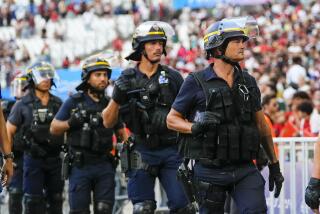Olympic Security Worries Intensify
- Share via
LAUSANNE, Switzerland — Security concerns surrounding the 2004 Summer Olympics in Athens have intensified since terrorist attacks last month in neighboring Turkey that killed 61 people, including four suicide bombers.
The bombings in Istanbul, Athens 2004 President Gianna Angelopoulos-Daskalaki said Thursday during an International Olympic Committee executive board session, prompted government officials in Greece to undertake a “reassessment of the whole situation.”
She said, “What we promise is relaxed Games, secure Games for the people and happy Games as well. We have to perfect that.
“We have to do whatever it takes to have this goal of secure Games.”
Officials connected to the Games have stressed in recent days that the Istanbul bombings will not effect a revolution in security planning. They have previously said they intend to deploy 58,000 security personnel. That compares to 15,000 in Sydney at the 2000 Olympic Games.
Security costs for the 2004 Games are already budgeted at $1.2 billion at current exchange rates and are likely to increase.
Training includes scenarios such as an airplane hijacking, hostage rescue, close-combat warfare, truck bombings, even the deployment of weapons of mass destruction. Two major training exercises remain on schedule for February and March, officials said.
Nonetheless, the bombings in Turkey forced Greek authorities to recognize the proximity of potential attacks. “Terror comes to the neighborhood,” is how one daily newspaper put it.
Prime Minister Costas Simitis said officials were already planning for all contingencies. But, speaking Wednesday in Athens to reporters, he acknowledged that the bombing of two synagogues and of British targets in Istanbul “showed us new ways” that extremists can hit.
IOC President Jacques Rogge, visiting Athens last week, told a news conference that more visible security measures may be in the offing.
“If the result of this means that athletes, spectators or officials have to undergo more security checks, let it be so,” he said. “If we see police and/or armed forces at the Games, let it be. If it is needed, then we are glad that they are there.”
As it is now, in Athens there are few -- if any -- overt signs of increased security.
Thousands of Greeks and visitors enter the city’s showcase new Metro system without screening. Hotels do not have metal-detecting devices nor do doormen search bags of people entering their lobbies -- even at a luncheon this week with Simitis attended by several hundred journalists and diplomats. Visitors can enter government ministries with little or no inspection.
Reporters given a tour Thursday of several Olympic sites noticed graffiti spray-painted on walls. Organizers would not address the question of how the taggers gained entry.
Government spokesman Telemachos Hytiris said, “Everything will be in place as of Jan. 1, and will be scaled up.”
Greek police and the Greek military are in charge of Games-time security operations. But officials indicated recently that NATO would play a more significant role. An Associated Press report from Athens suggested that NATO’s assistance might include military assistance and, if need be, casualty evacuations.
Senior Greek officials also said Russia has been added to the group of nations advising Greece in the run-up to the Games. Others in the group: the United States, Britain, Israel, Germany, France, Spain and Australia.
Thomas J. Miller, U.S. ambassador to Greece, said, “Cooperation between the U.S. and the Greek side is excellent. Both sides have realistic appraisals of what needs to be done and, along with other interested nations, are working closely to bring about our shared goal of safe and secure Olympics.”
Even so, Greece’s foreign minister, George Papandreou, made clear this week a point that many Greeks have stressed ever since being awarded the Games, that help from others may be welcome but these Olympics must be understood from the outside, as they are inside Greece, as Greece’s Games.
“We must not see international cooperation on security issues regarding the Olympic Games as pressure on Greece, because before everybody else the Greeks themselves desire safe Games,” Papandreou said Wednesday in Athens.
Angelopoulos-Daskalaki put a slightly different twist on it Thursday, saying, “I remember what I promised the international Olympic community in 1997,” that “it’s not all about what we can get from the Games -- and all countries can get huge things from the Games, important changes -- but what we can offer the Games.”
The decision Thursday to hold the shotput competitions at Olympia, for instance, “[shows] the world that the Olympic Games ... can always be contemporary, [can] send very strong messages and symbolic messages all over the world.
“We have another 253 days,” she said. “Every day we know the exact number. We don’t relax. We remain vigilant, even alert. We know what we promised the world. We know what Greeks -- what they expect. We will not let people down.
“We will,” she said, “organize Games that will give the impression that we want and the message that we want.”
*
Wilkinson reported from Athens.
More to Read
Go beyond the scoreboard
Get the latest on L.A.'s teams in the daily Sports Report newsletter.
You may occasionally receive promotional content from the Los Angeles Times.







